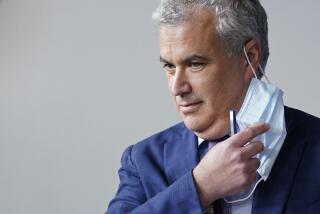Sununu May Cut White House Staff : Prepares for New Job but Finds It Hard to Make Changes
- Share via
WASHINGTON — New Hampshire Gov. John H. Sununu is learning the lesson of Washington: The government does not shrink.
Not quite three weeks into the preparations for his new job as chief of staff of George Bush’s White House, Sununu said that he would like to start with a White House staff smaller than President Reagan’s. But, he added: “I’m learning it’s hard to do this. There’s always a resistance to change.”
Until he leaves his current job--his third two-year gubernatorial term ends at noon on Jan. 5--Sununu is planning to spend about two or three days a week in Washington wrestling with tough organizational challenges and other personnel tasks, he said in an interview Monday.
Expendable Posts
As state chief executive, Sununu aggressively reshaped and streamlined New Hampshire’s government bureaucracy to promote efficiency and cut costs. Now, he says, he is trying to figure out what functions in the White House must be filled and which posts might be expendable. Under Reagan, there are 323 full-time employees on the staff.
Next week, he said, he will turn to the task of filling staff positions. In an institution as large and powerful as the presidency, the chief of staff’s operation is a crucial one that must fit the sensibilities of each occupant of the Oval Office. The talents and moves made by the staff chief, who controls access to the President and the flow of information to him, can go a long way toward determining the ultimate success of his boss.
Sununu, recognizing this, said that he does not intend to model his stewardship of the office after any one of his recent predecessors--a line that extends back more than 30 years to the presidency of Dwight D. Eisenhower, when Sherman Adams, another former governor of New Hampshire, ran the White House staff.
“George Bush has a style of operations that is different from Ronald Reagan, different from Jimmy Carter, different from Dwight Eisenhower,” Sununu said.
In forging his White House machinery, Sununu said, one particular Bush trait he is striving to accommodate is the President-elect’s way of using the telephone.
An engineer by training, Sununu is trying to figure out how the senior staff can keep up with Bush as he carries out his trademark practice of continually reaching out and touching someone in his vast network of friends, advisers and political contacts.
“That’s one of the great things he does, developing some of his personal relationships,” Sununu said. And he does it by telephone “at all hours.”
Such calls may be mere chats but they also may produce valuable information--or presidential commitments. They must be logged, not just in the routine minute-by-minute accounts that are kept of the President’s day but in the realm of staff members who “capture the information” for the Administration’s use, Sununu said. A system must be devised that manages this resource without slowing the President down or discouraging him from maintaining his contacts, he said.
While Sununu ponders a White House framework, speculation churns about who will join him in it. The name of Robert Teeter, the poll-taker who is one of Bush’s closest political advisers and who is helping direct his transition effort, is prominently mentioned.
Soon after the election, some suggested the idea of a power troika in the staff chief’s job, with Teeter, Sununu and Craig Fuller, the vice presidential chief of staff, dividing the responsibilities and jurisdiction. But Bush’s choice of Sununu for the post alone, and Fuller’s decision to return to the private sector, ended that approach.
Now, Sununu said, he is engaged in discussions with Teeter about the job of deputy chief of staff, which Michael K. Deaver turned into a position of extraordinary influence in Washington during Reagan’s first term.
Sununu indicated that Teeter, with a particular interest in domestic policy, may be responsible for that element of White House operations. He has challenged as inaccurate one account in which Teeter was said to have sought wide responsibilities over communications and domestic policy.
“A deputy is a deputy. His responsibilities (would be) across the board. You divide up the day-to-day activities. If he does his job perfectly, I don’t have to do anything,” Sununu said, with a smile.
More to Read
Sign up for Essential California
The most important California stories and recommendations in your inbox every morning.
You may occasionally receive promotional content from the Los Angeles Times.













